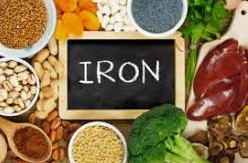Iron is a crucial mineral that plays a vital role in the healthy development of children. It is essential for the production of hemoglobin, which carries oxygen in the blood, and supports overall growth and brain development. Unfortunately, iron deficiency is a common issue among children, leading to problems such as fatigue, poor concentration, and developmental delays. In this blog post, we will explore the importance of iron in children’s development and highlight some of the best iron supplements for kids.
Why role of Iron is Important for Kids:
Iron is necessary for cognitive development and physical growth. It helps in the formation of hemoglobin and myoglobin, which transport oxygen to the brain and muscles. Adequate iron levels are essential for energy, focus, and learning. Without enough iron, children may experience anemia, leading to weakness and developmental challenges.

5 Best Iron Supplements for Kids:
To ensure your child gets enough iron, consider the following supplements:

1. Flintstone Vitamins with Iron:
Flintstone Vitamins with Iron are a popular choice among parents. These chewable vitamins are easy for kids to take and provide a balanced dose of essential nutrients, including iron.

2. Novaferrum Iron:
Novaferrum Iron supplements are known for their high-quality ingredients and effectiveness. They come in liquid form, making them ideal for toddlers and young children who may have difficulty swallowing pills.

3. Chewable Iron Supplements:
Chewable iron supplements are convenient and kid-friendly. They are available in various flavors, ensuring that children are more likely to take them regularly.
4. Iron Drops for Toddlers:
Iron drops are a great option for toddlers. They can be mixed with food or drinks, making it easy to administer the correct dosage.
5. Iron Vitamins for Kids:
There are many iron vitamins available specifically formulated for children. Look for those with additional vitamins and minerals to support overall health.
How to Choose the Right Iron Supplement:
When selecting an iron supplement for your child, consider the following factors:
- Age and Dosage: Ensure the supplement is age-appropriate and provides the correct dosage.
- Form: Choose between chewable tablets, liquid drops, or gummies based on your child’s preference and ease of use.
- Additional Nutrients: Some iron supplements come with added vitamins and minerals that support overall health.
Tips for Preventing Iron Deficiency:
In addition to supplements, you can prevent iron deficiency by including iron-rich foods in your child’s diet. Foods like lean meats, beans, spinach, and fortified cereals are excellent sources of iron. Pairing these foods with vitamin C-rich foods like oranges and strawberries can enhance iron absorption.
conclusion:
Ensuring your child gets enough iron is essential for their growth and development. Iron supplements for kids, such as Flintstone vitamins with iron, Novaferrum iron, and chewable iron supplements, can help prevent iron deficiency and support healthy development.
When selecting the best iron supplement for kids, consider their age, preference, and nutritional needs. Options like iron drops for toddlers and iron vitamins for kids can make it easier to incorporate this vital nutrient into their daily routine. Remember, a balanced diet rich in iron, alongside the right supplements, can greatly benefit your child’s health and well-being.
FAQS:
Q: What happens if a child is low on iron?
Low iron in children can lead to iron deficiency anemia, causing fatigue, paleness, and difficulty concentrating. It can also impact growth and development. Early detection and treatment are important for your child’s health.
Q: Is it good to give iron to kids?
It depends. Here’s a short answer:
- Generally, healthy children get enough iron from a balanced diet. Iron-rich foods like red meat, beans, and leafy greens are the best source.
- However, iron deficiency is common in children, especially toddlers. If your child shows signs of low iron (fatigue, paleness), consult a doctor.
- Doctors might recommend iron supplements for children with iron deficiency.
It’s crucial to consult your doctor before giving your child any iron supplements. They can assess your child’s needs and recommend the best course of action.
Q: What are the roles and functions of iron?
Iron plays a vital role in several key functions within the human body:
- Oxygen Transport: The most crucial function of iron is its role in carrying oxygen. It’s a key component of hemoglobin, the protein in red blood cells that binds to oxygen in the lungs and delivers it throughout the body. This oxygen fuels all our activities, from running and playing to thinking and growing.
- Energy Production: With sufficient oxygen delivery from iron-rich red blood cells, our bodies can efficiently convert nutrients into energy. This keeps us feeling energized and helps us perform daily tasks.
- Muscle Function: Iron is also essential for proper muscle function. It’s involved in enzymes that help muscles contract and relax effectively, allowing us to move and be active.
- Brain Development: Iron plays a crucial role in brain function and cognitive development. It supports healthy neural connections and helps with memory, concentration, and learning.
- Immune System Function: Iron is also necessary for a healthy immune system. It helps white blood cells function properly, which is crucial for fighting off infections and illnesses.
Q: How does iron help brain development?
Iron helps brain development by supporting oxygen transport, energy production, neurotransmitter synthesis, myelin formation, and neuronal growth. Adequate iron levels are essential for cognitive function, learning, and memory in children.
Q: How to increase iron in kids?
To increase iron in kids, you can follow these strategies:
- Iron-Rich Foods: Include iron-rich foods in their diet such as lean meats (beef, chicken), fish, beans, lentils, tofu, fortified cereals, spinach, and dried fruits (apricots, raisins).
- Vitamin C: Pair iron-rich foods with foods high in vitamin C (oranges, strawberries, tomatoes) to enhance iron absorption.
- Limit Calcium-Rich Foods: Avoid giving calcium-rich foods (dairy products) with iron-rich meals as calcium can inhibit iron absorption.
- Cooking Methods: Use iron cookware for cooking acidic foods (tomato sauce) and avoid using tea or coffee with meals as they can hinder iron absorption.
- Iron Supplements: Consider iron supplements for kids if they have iron deficiency and consult with a pediatrician for appropriate dosage and form (chewable tablets or liquid drops).
Q: What are the behavioral symptoms of iron deficiency?
Iron deficiency can manifest in various behavioral symptoms alongside the more common physical signs like fatigue and paleness. Here’s a breakdown of some key behavioral indicators:
- Reduced Concentration and Learning Difficulties: Low iron can affect cognitive function, making it harder for children to focus, learn, and retain information. They might be easily distracted and struggle in school.
- Irritability and Mood Swings: Iron deficiency can contribute to irritability, frustration, and mood swings in children. They might become more easily upset and experience emotional fluctuations.
- Decreased Activity Level: Low energy levels caused by iron deficiency can lead to a decreased desire to play and be active. Children might display less enthusiasm for physical activities they once enjoyed.
- Social Withdrawal: In some cases, children with iron deficiency may withdraw socially due to fatigue, difficulty concentrating, or feeling irritable. They might isolate themselves or avoid social interaction.
- Restlessness and Difficulty Sleeping: Iron deficiency can disrupt sleep patterns. Children might have trouble falling asleep, wake up frequently at night, or experience restless sleep.
Q: Is egg rich in iron?
Eggs are not particularly rich in iron compared to other foods like meat, beans, or fortified cereals. They contain a small amount of iron, but it is not considered a significant source of this nutrient.
Q: Is milk rich in iron?
No, milk is not considered to be rich in iron. It contains very little iron compared to other foods such as meat, beans, and fortified cereals. If you’re looking to increase iron intake, other sources would be more beneficial.
External Resources:
For more information on iron supplements and children’s health, visit these trusted sources:
- American Academy of Pediatrics
- Centers for Disease Control and Prevention
- National Institutes of Health

Empowering parents to raise happy, confident kids. Get practical parenting tips and advice on our blog, Smart Parent Guides.
